As a lapsed Episcopalian-turned-agnostic who grew up on science fiction and superhero comics, I’ve spent a fair amount of time thinking about the divine. Spend enough time in the uncanny corners of fiction, though, and the definition of what constitutes the divine starts to look a little different. Some writers I’ve spent decades reading have spent the bulk of their career exploring nontraditional concepts of divinity and omnipotence—I feel reasonably sure that I could put together a list like this featuring only works by Neil Gaiman, to cite one example.
There’s also a way in which the fantastical can wrestle with big questions about divinity, immortality, and omnipotence in ways both unexpected and irreverent. Sometimes that comes as an outgrowth of exploring the rituals and dogma of an existing religion—consider the ways someone like James Morrow or James P. Blaylock takes aspects of Christianity and turns it into thought-provoking speculative fiction that’s unlikely to be taught in a Sunday School class. Sometimes it involves imagining a forgotten deity, or a long-dead one, or one capable of bringing eldritch horrors to bear upon the world.
So here’s a look at five books with strange gods and strange concepts of gods. Whatever your own personal cosmology might be, hopefully you’ll find something to spark inspiration in these words.
Dead Country by Max Gladstone
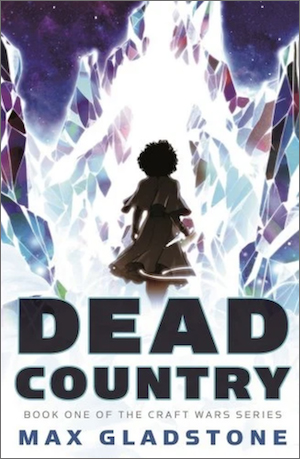
There are plenty of reasons to find Max Gladstone’s Craft novels—the six volumes of the Craft Sequence, as well as the Craft Wars series that’s officially underway with Dead Country—appealing. Some of those have to do with the characters; others have to do with the setting, which feels sprawling and alive in a way few other books do. But there’s also the way that Gladstone deals with magic and divinity in these books, and that’s where things get especially intriguing.
The use of magic here feels more like law than anything else: a series of arrangements and agreements, one where a successful practitioner can think on the fly, with transformative effects. As for the gods in these books, well — are you familiar with Abraham Bosse’s frontispiece for Thomas Hobbes’s Leviathan? The one with a giant figure made up of a whole bunch of smaller figures; a kind of diagram of society as literally made up of the members of that society? That’s not far removed from what Gladstone is going for here, and if you think that that might pave the way for some grand storytelling opportunities, you’d be spot-on. Having established this as one of the central parts of these books’ setting, Gladstone then explores how gods’ rise and fall could affect the people around them — and what sort of beings might put the gods themselves at risk.
Viscera by Gabrielle Squalia
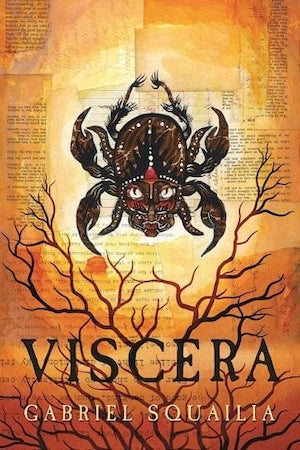
Sometimes the right recommendation in the right place can have a huge impact. Years ago on a visit to Seattle, I stopped by Elliott Bay Book Company in Seattle, where I learned long ago that the staff picks are well worth heeding. It was while browsing the SFF section that the cover of Gabrielle Squalia’s Viscera caught my eyes, and soon enough I’d picked up a copy and gotten hooked.
There are gods aplenty in Squalia’s novel, but here’s the thing: they’re all dead. And for the characters in this novel, harvesting their remains brings with it the gateway to euphoric experiences. In other words, yes, this is a novel set in a fantasy world in which the illicit drug of choice is made from the decomposing corpses of deceased deities. It’s probably worth mentioning here that this is in no way the strangest element of Squalia’s novel, which abounds with memorable characters, odd alliances, and stunning imagery.
Settling the World: Selected Stories 1970-2020 by M. John Harrison
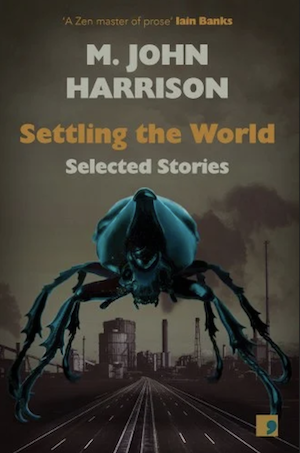
I’m a bit of a latecomer to M. John Harrison’s work; I read The Course of the Heart for the first time years ago, when I don’t think I was quite ready for it. Years later, I ended up reading a whole lot of Harrison’s work for a long article on his fiction; this time, I was ready. The title story of the retrospective collection Settling the World is a kind of breakneck journey into the unknown, one that has more than a little espionage fiction in its DNA.
That’s not all it has, though. Here’s the story’s first sentence: “With the discovery of God on the far side of the Moon, and the subsequent gigantic and hazardous towing operation that brought Him back to start His reign anew, there began on Earth, as one might assume, a period of far-reaching change.” I’m not sure M. John Harrison is given to mic drops, but I like to imagine him doing precisely that upon finishing that sentence. From there, the story takes on aspects of a thriller, as its protagonist is assigned to investigate a stretch of road known as God’s Motorway — and becomes embroiled in a spy thriller plot with the added element of an unknowable deity looming above the proceedings.
The City We Became by N.K. Jemisin
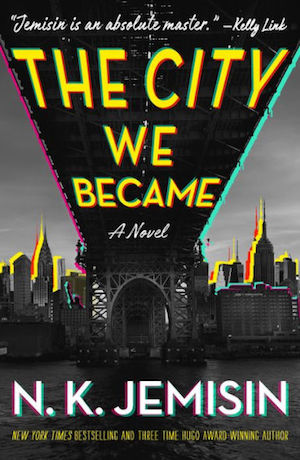
Speaking of writers whose work comes at questions of divinity from different angles, I think it’s safe to say that N.K. Jemisin also falls into this category. Whether it’s the palace intrigue-plus-gods aspects of The Inheritance Trilogy or the the concern with world-changing powers and sprawling lifespans in the Broken Earth novels, Jemisin’s bibliography suggests that she’s thought a lot about some of the grandest questions that theologians have posed over the years — and finds fascinating ways to incorporate them into her work.
The City We Became offers a very different spin on these concepts, though it’s also rooted in grand questions about humanity, society, and higher powers. In this case, those higher powers are people granted a kind of divinity by the places that they live—which puts them into conflict with agents of a repressive eldritch power looking to leave its mark on Earth. Think local gods, who can stand together or skirmish, depending on the circumstances; the result is a concept at once classical and contemporary.
Revelator by Daryl Gregory
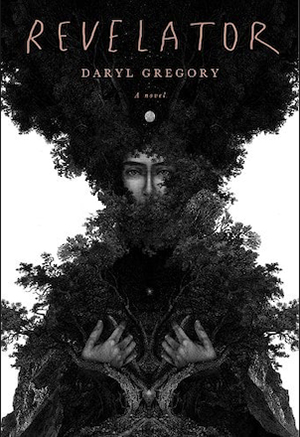
There’s a lot about Daryl Gregory’s Revelator that feels wrought from history. It’s set in Prohibition-era Tennessee, and follows the life of a young woman at odds with her family’s strict religion and said family’s deeply-buried secrets. It’s when Gregory gets into the nature of that religion that things get significantly stranger, as one family’s idiosyncratic belief system turns out to have its roots in something uncanny.
The presence of Revelator on this list gives you a pretty good indication of what’s at the root of those beliefs. But the being that dwells there, the Ghostdaddy, pulls off the impressive feat of feeling both compellingly divine and fundamentally alien. And it’s there, too, that Gregory gets at a question that theologians and cosmic horror writers alike have reckoned with: what does it mean if a divine intelligence was fundamentally beyond our comprehension?
Tobias Carroll is the managing editor of Vol.1 Brooklyn. He is the author of the short story collection Transitory (Civil Coping Mechanisms) and the novel Reel (Rare Bird Books).










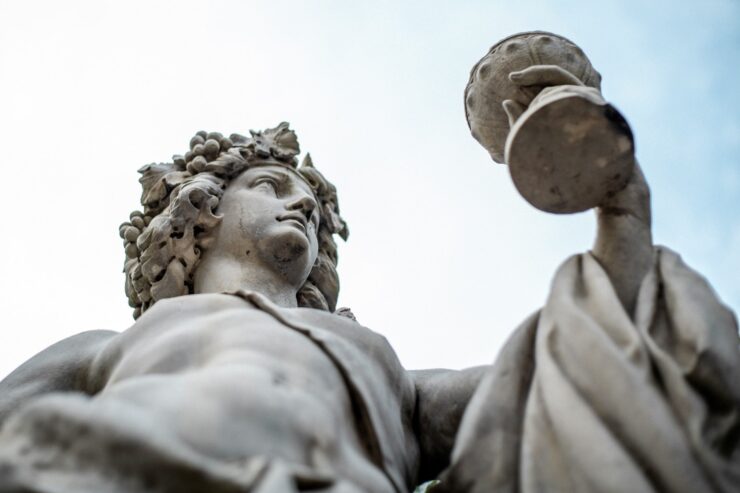

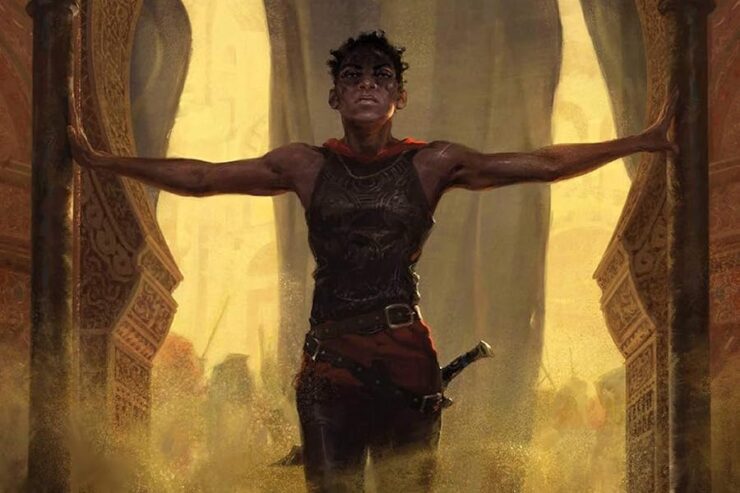
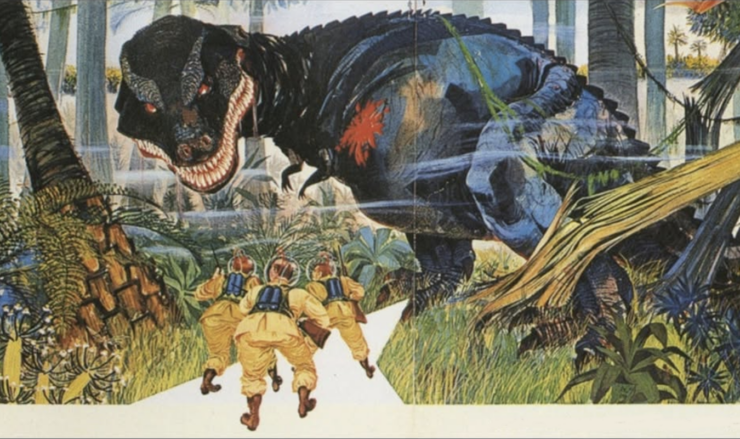

The Silt Verses (a podcast) is chock full of gods. the legal ones like Sweet Jolly Crunch-tooth (patron of grains and cereals) and the Flush Divine (apparently patron of toilets and what one needs them for) are odd – and horrifying – enough. The illegal ones like the Trawler-man and the god of Penda’s Slake… well, listen and shudder.
Terry Pratchett’s Small Gods.
@2 – I came to recommend Smart Gods as well. It is not only a great book but it also allows you to jump into Discworld without needing much backstory from the rest of the series.
The book addresses why gods are born and how they die (Om is just one among many extant gods). It looks into how religion attempts to control it’s god through rites and scriptures. It also discusses the nature of ‘truth’ for the public and ‘truth’ for the priesthood.
As a bonus there’s a marvelous satire of Ancient Greek philosophers.
Speaking of Pratchett, there’s Mrs. Gogol and her hand-made gods – Stride Wide Man, Hotolaga Jones, Mister Safe Way, and probably some others.
Rachel Aaron’s DFZ setting has an alternate take on gods embodied in cities, and on how gods can be generated by human belief. Also featuring dragons, millenia-long plans by dueling seers, a magical cyberpunk dystopia, romance in difficult circumstances, the occasional kaiju problem, and a pigeon.
You could also make a list with just Zelazny books…
I picked up the “GURPS Fantasy II: Adventures in the Mad Lands” sourcebook from Steve Jackson Games many ancient years ago. The first Fantasy sourcebook had included a fairly generic fantasy world as a background, but Fantasy II was focused on a bleak world with strange magic.
The pantheon of gods roamed the world, uncontrollable, destroying or driving mad everyone they encountered. They included a bear, a pig, a child, a hare, a cougar, an owl, Big Leaper, and Little Leaper.
In other words, the gods were the characters from the Winnie the Pooh stories, rendered as mindless cosmic horrors.
I’ll recommend The Jesus Incident by Frank Herbert. Heavy emphasis on the “strange” though. I enjoyed it a lot if only for the weird psychedelic horror (but definitely not only..) Like a lot of Herbert, it’s got some pretty dense philosophical stuff going on, but it moves along at a good pace and kept me thinking about it for a while after I finished reading it.
There are strange gods in _Godstalk_ by P. C. Hodgell. Let’s just say the temples contain the gods to keep them out of people’s way most of the time.
Lieber’s Fahrd and the Gray Mouser stories have strange gods.
As for Zelazny, especially _The Isle of the Dead_ and _To Die in Italbar_.
In Bujold’s World of the Five Gods series, the eponymous gods directly intervene in human history so frequently that everybody has met someone to whom it has happened. Nevertheless, one culture in that world has managed to invent Quadrenism and persecutes followers of the demonized fifth god unto death.
As to their exact character, I can’t think of quotes that don’t spoil what for me are the delights of reading the books for the first time. But they are wondrous.
@10
The Five Gods books are indeed wondrous, but I wouldn’t characterize the Five Gods Themselves as notably strange. They’re a fairly straightforward pantheon with a fairly straightforward creation myth. They’re not eldritch horrors or gods of anything unusual, they don’t incarnate and cause trouble, they even have reasonably comprehensible motivations as gods go.
It’s also not that common for people to be directly touched by the Five Gods, it’s just that all the protagonists are people They’ve taken a personal interest in, so there’s a selection bias going on in what we see
Simon R. Green’s Street of Gods, which carries through all his connected series. You get gods like Razor Eddie, Punk God of the Straight Razor, or the very disturbing Lamentation.
The Three and the Firstborn in the October Daye series are weird gods optimized for family drama.
Tim Powers’s versions Egyptian gods and Romani magic in The Anubis Gates and voudoun gods in On Stranger Tides are, as I understand it, a synthesis of much contradictory lore that he sorted through for the purposes of creating uniquely consistent versions for the stories he wanted to tell. At least, that’s how I remember him describing it at a Boskone many years ago.
I’d add in the Vlad Taltos books – Verra and the other gods in the Dragarean pantheon that Vlad and his friends encounter with surprising regularity during the series.
So glad somebody’s already mentioned The Silt Verses. Brilliantly written podcast, with uniquely horrifying and elaborate worldbuilding to go with an assortment of morally complex worshippers.
Anytime someone talks about multiple gods (and their craziness) I always think of Jacqueline Carey’s Sundering and Banewreaker series (duology). Very dense but oh so good and worth the time to read.
Gail Carriger’s new book Divinity 36
“Welcome to the divinity. Where there is no difference between celebrity and religion, love and belief, acolyte and alien. Where the right kind of obsession can drive a person crazy or turn them divine.”
Her usual character driven story is a really interesting take on what it means to be a god.
I think N. K. Jemisin’s Inheritance trilogy does better with weird gods than The City We Became. There are just quite literally so many odd gods about and the third book is from the point of view of the first god in the second generation of gods, and it is so… weird. But good.
Poul Anderson’s _Operation Chaos_ presents an alternate universe where God and the Devil are every day forces to reckon with, as well as other unfriendly critters. Well woth tbe read – hop on your dual broomstick and start reading.. !
I have just discovered the Four Horsemen books by Dave Turner (who somehow leaves out Pestilence and has Conquest in the gang instead) where we find out how Death likes his tea, among other things. Not as twee as Fforde, but oh so definitely full of British humor.
The Raven Tower by Ann Leckie. One of the main characters is a god in a rock! And there are lots other gods
H.P. Lovecraft and China Mieville. The latter’s New Crobuzon stories, but also his neglected King Rat.
What? No love for Tanith Lee’s Tales from the Flat Earth? Tsk. I’d also like to sow another vote for Zelazny.
Shigidi and the brass head of Obalufon, by Wole Talabi, absolutely superb take on certain African gods. Brilliant writing, great plot, unforgettable characters, one of my top reads of 2023.
Archer’s Goon by Diana Wynne Jones. A small town is run by seven trapped demi-gods. Possibly the weirdest premise I’ve seen for an SFF novel.
By modern standards, the premise doesn’t seem all that weird, but I’m rereading it now, and it still seems very strange. Maybe it’s the gradual chaotic way the idea is introduced, or maybe the way the demigods (who seem like a very acrimonious human family) are described as “farming” various aspects of life.
Likewise a long lapsed Episcopalian, who spent many years reading and studying world religions in hope of finding a replacement. While the search was educational and interesting, eventually I gave up, settling for cherry-picking the best values I found and becoming a mildly spiritual agnostic.
That said, I still have a fascination with stories containing deities, and I own the entire collection of James Morrow books, among many others. The ones you list are new to me, so I have just added two of these to my Amazon wish list/TBR list.
I wish I had more faith (pun intended) in Jemisin, as the synopsis sounds cool, but I struggled through the ugliness of The Fifth Season, and – still desperate to prove I hadn’t wasted brain cells – also the beginning of The Obelisk Gate before giving it up as too painful. Her world building skills are unquestionably impressive, but the characters and story in this case were the direct cause of a profound depressive state that took weeks to shake off.